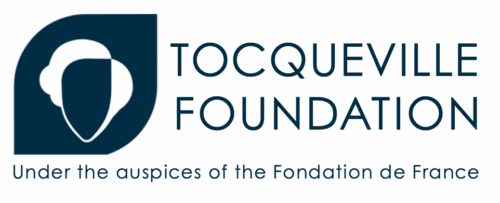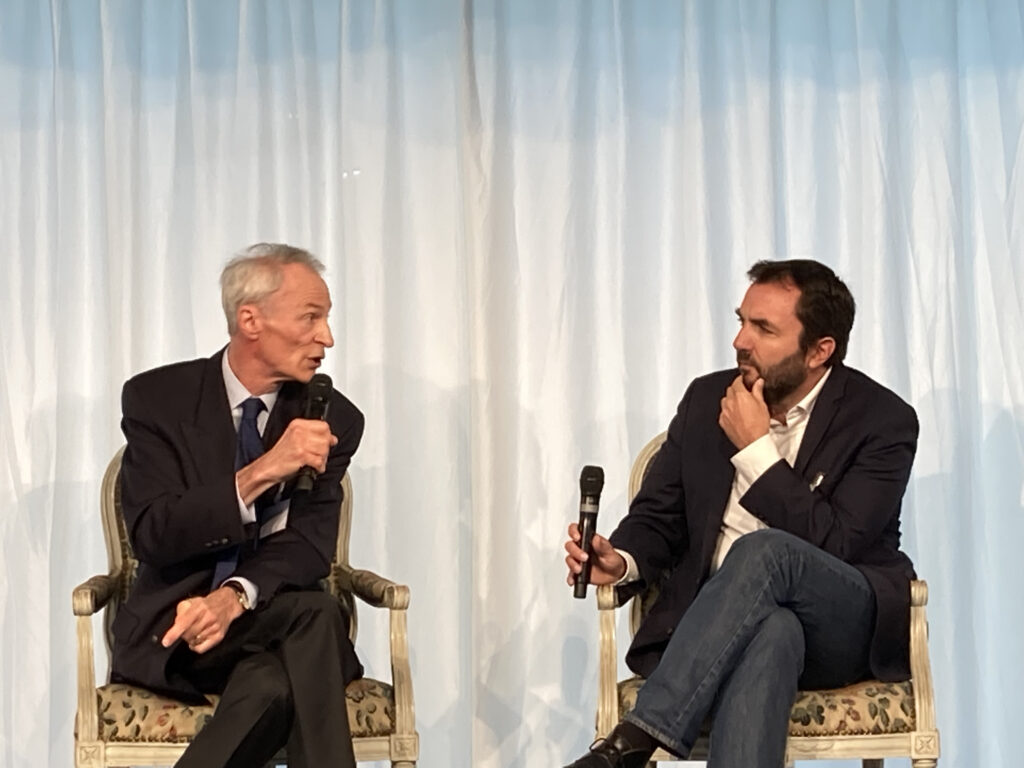Tocqueville Conversations 3rd Edition, “The Future of Democracy in America”, September 17-18, 2021
Please find the programme of the 2021 edition of the Conversations in English here, and in French here.
The replay of the conferences is also available on our youtube channel by following this link for the French version, and this one for the English version.
Two volcanoes: chronicle of a crisis foretold
There is a rage slowly burning through America. A rage that could well destroy the foundations of the oldest Western democracy : its institutions, its mores, its common understanding of how to live together ; its capacity to build a world and iron out disagreements through political dialogue. Deeply divided, Americans are losing trust in their system, in their elites, in their nation, and in each other. They are losing sight of a common future. The prospect of citizens losing sight of each other and starting hating each other, deeply disturbed Alexis de Tocqueville, author of Democracy in America. No author since has rivaled Tocqueville’s analysis of the frailty of democracy, and its tendency to devolve into tyranny. He clearly saw that such tyranny would be inevitable if isolation and discord emerged. « A Despot will forgive his subjects for not liking him provided they do not love each other, », he wrote.
As we watch the political crisis unfolding in America, Tocqueville’s warning was frighteningly prescient.. Emblematic of this crisis was the 6th of January outburst, at which an angry crowd, behaving like a mad bull, burst into the halls of Congress, destroying doors and windows. Was it a spontaneous movement of anger brought about by Donald Trump’s insistence that he had been stolen of the election? A revolutionary outburst, signalling something deeper ? A carefully planned attack ? The answers to these issues are still under discussion, and greatly divide the country. But well beyond Trump, his actions and his future, the mob’s ouburst expressed a deeper and very worrying undercurrent : a significant segment of the American society – perhaps as large as 75% of the Republican electorate, does NOT believe the result of the presidential election are fully legitimate. This staggering number illustrates the collapse of trust that is now at work in American society. It is a deeply worrying fact, one that cannot be ignored, and which goes far beyond the question of Donald Trump’s political future. His exit from the White House was not the beginning of the crisis, nor will it be the end of it. The reality is that Joe Biden is beginning his presidency at a time when the United States is a country engulfed in a political crisis that is both disturbingly broad and deep
There are two major sources of rage in America today: The Trumpist rebellion and The Social Justice movement asking for a total redefinition of the American project.
The Trumpist « rebellion » is far from over. What are the roots of this revolt ? Among other causes are globalization, desindustrialization, staggering economic inequalities, cultural alienation…all of which have translated into the growing gap between an ascendant elite and a citizenry cut adrift in fly-over country. How can the governing elites reconnect with the American worker and the middle class, which have lost faith in their leaders. Are we facing a mental and political « secession » which is going to disrupt the whole political system? How should the elites, both democratic and Republican, react to this « new constituency » ? Is there a threat of radicalization of this wing ? Is there a real potential for the emergence of a new far right white nationalist movement—a scenario many observers on the liberal side, seem to be particularly fearing ? What is the future of the Trumpian populist revolt ? Will Trump remain the central figure on the stage ? If not, who will replace him as leader of the populist wing of the Republican party? Also is the Trump movement only negative, or does it constitute a necessary balancing force, in the face of the Radical identitarian movement that is emerging on the other side of the political spectrum ?
This movement, which defines itself as « woke » (awake to racial and gender discriminations), sees antiracism and Social Justice as its fight. But obsessed by the framework of identity (be it race or gender), the Social Justice warriors have turned a very legitimate cause into a quasi-religious mission, ending up portraying the world as a new fight between groups defined by their status of « privilege » or « victimhood ». Very much like the bourgeois man had to be targeted to let the Proletariat triumph, Western white heterosexual males are the new “guilty group”, who should atone for their sins and offer the other groups, women, LGBTQI, Blacks and Browns, reparations and access to « positions of power ». The politics of identity have therefore started to slide into a form of «excommunication» of anyone who dares to disagree with the Woke ideology. Born on campus of American universities, this movement has dangerously migrated into the media, business, the Democratic party. How can America get back to some kind of common sense thinking about what it means to be a citizen ? How can it seek to heal the wound of slavery and its legacy, and invite all of its citizens to actively participate and benefit from all that the country has to offer , without falling into the trap of a Orwellian social crusade that is threatening to transform American society into an arrangement in which every group is at war with the next?
How can the United States reestablish the genuinely liberal political and social arrangements Tocqueville thought so necessary for democracy to thrive ? That is the question before us. In light to the rage and passion identity politics create on both sides, is it even possible to recover the Tocquevillean hope that democratic citizens can build a world together and develop the competencies they need to feel that they are stakeholders in their own society ?
The challenges on these two « fronts » are deeply aggravated by the revolutionary technological changes that are quickly altering the shape, rythm and philosophical priorities of our societies. The emergence of social media as a gigantic «reorganizer » of our lives and institutions raises very deep (and unsettling) questions about the new organization of society. The amplified noise of social media, made of real but scattered news, but also of post-facts, fake news, deep fakes and partisan indignation, often covers the truth and paralyses our critical thinking. In a paradoxical and unexpected turn, social media have in many ways become the « elder brother » of traditional Media, dictating the tone and driving it to providing an emotional and ideological approach to news. In many ways, technology has aggravated and deepened polarization,. This has encouraged the spreading of propaganda rather than the necessary task of promoting understanding and offering a common ground. A deep understanding of issues, which is necessary to get a truthful picture of our world, seems to be increasingly difficult to achieve. How will our democracies handle the crises of tomorrow in this hobbled condition ? How can it facilitate the development of a social consensus if the citizens can’t even get to the facts? Isn’t truth one of our dearest values ?
The concentration of technological power in the hands of a few private companies that have come to represent a dangerously powerful oligarchy also raises enormous democratic and political issues, as the polemics surrounding the ban of President Trump’s twitter account and then the deplatforming of some of his allies or the hasty ban of the Lab version of the origin of Covid suggest.

